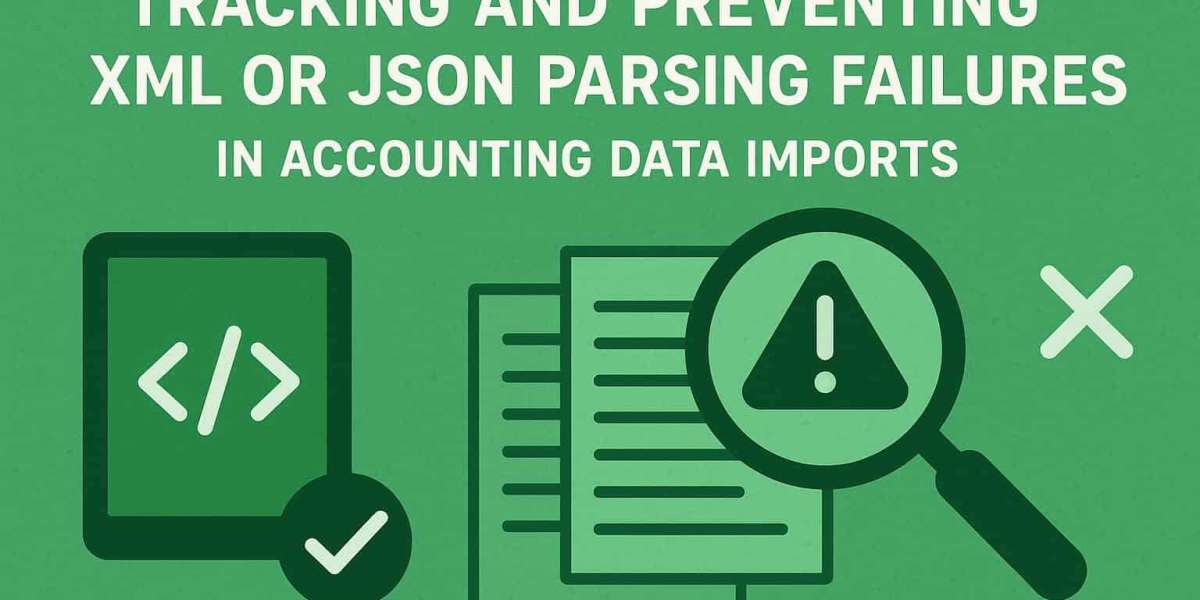In accounting systems, every data import depends on the successful parsing of structured files such as XML (Extensible Markup Language) and JSON (JavaScript Object Notation). Parsing determines how financial data is interpreted, validated, and integrated across ledgers, invoices, and transaction records. A single parsing failure can interrupt automated imports, cloud synchronization, and remote accounting workflows.
Modern financial platforms like QuickBooks, Tally, Zoho Books, Xero, and Sage rely on consistent XML and JSON structures to maintain data uniformity across local and cloud instances. When parsing fails due to incorrect syntax, incomplete payloads, or network-induced corruption, accounting systems generate errors that block synchronization and distort financial records.
This article provides a complete examination of XML and JSON parsing failures in accounting data imports. It defines how parsing operates within financial applications, outlines the main technical causes, describes how different software platforms manifest such errors, and explains methods to diagnose and prevent them. It also covers the influence of remote synchronization, cloud mirroring, and hosting configuration on data integrity.
Accurate parsing is not just a technical requirement but a financial safeguard. Understanding its process and failure mechanisms enables accountants and system administrators to maintain uninterrupted synchronization, reliable imports, and error-free ledgers across distributed accounting environments.
Technical Understanding of Parsing Failures
A. Understanding XML and JSON Parsing in Accounting Systems
XML and JSON parsing defines how accounting software interprets and structures imported financial data. Each import file contains elements such as account codes, invoice numbers, transaction values, and customer identifiers. The parsing mechanism verifies these elements, aligns them with internal schema definitions, and transfers validated data to the main ledger database.
In accounting environments, XML uses tag-based syntax while JSON operates through key–value structures. Both ensure data readability and machine compatibility. The accuracy of parsing determines whether imported transactions integrate correctly with existing datasets or trigger rejection errors. A parsing failure occurs when the system encounters misplaced tags, invalid characters, or incomplete structures.
Correct parsing ensures consistent financial representation, seamless synchronization, and error-free reconciliation. Every accounting process—whether invoice posting, payroll integration, or ledger synchronization—depends on the successful interpretation of XML or JSON files.
B. Structural Comparison: XML vs. JSON in Financial Imports
XML (Extensible Markup Language) follows a strict hierarchical tag-based format that allows detailed nesting of financial records. JSON (JavaScript Object Notation) applies a lightweight, key–value model optimized for rapid data exchange. In accounting imports, XML supports legacy applications like Tally ERP and Sage, while JSON dominates modern cloud platforms such as QuickBooks Online, Zoho Books, and Xero.
Aspect | XML (Used by Tally, Sage) | JSON (Used by QuickBooks, Zoho, Xero) |
Structure | Nested tag hierarchy | Key–value pairs |
Readability | Verbose but descriptive | Compact and fast |
Validation | Uses XML Schema Definition (XSD) | Uses JSON Schema validation |
Common Parsing Failure | Missing closing tags or misaligned hierarchy | Extra commas, unescaped characters, or missing quotes |
Both formats must maintain complete syntax consistency. Any deviation—such as an unclosed Voucher tag or an extra comma in a JSON array—instantly invalidates the import process.
C. Significance of Parsing Accuracy in Accounting Systems
Parsing accuracy directly influences financial data reliability. Each structured file represents transactional information that affects ledger balances, customer statements, and audit records. When parsing fails, dependent workflows stop, synchronization loops break, and automated imports remain incomplete.
A precisely parsed dataset eliminates duplicates, prevents mismatched entries, and ensures real-time data reflection across cloud mirrors and branch instances. In contrast, parsing errors cause structural inconsistencies that cascade into reconciliation mismatches and reporting delays. Therefore, maintaining parsing integrity is an operational necessity within every accounting ecosystem.
Common Triggers of Parsing Failures
XML and JSON parsing failures in accounting systems originate from structural inconsistencies, environmental disruptions, or integration mismatches. Each failure type affects how imported data is processed and stored. The following categories describe the main triggers that lead to parsing interruptions.
- File-Related Triggers
- File-related triggers occur when the imported XML or JSON file contains incorrect structure or encoding.
- A corrupted file structure prevents the parser from reading hierarchical or key–value relationships.
- Missing or mismatched XML tags instantly invalidate schema compliance.
- Incorrect encoding formats such as UTF-16 instead of UTF-8 generate unreadable byte sequences.
- Manual editing through spreadsheet or text processors introduces hidden characters that disrupt parsing.
- Schema mismatches occur when the data file structure deviates from the accounting software’s expected schema definition.
- Network and Hosting Triggers
In many accounting environments, external integrations fail to fetch required resources during import, leading to broken XML or JSON structures. Issues like outdated endpoints or inaccessible resources often produce behavior similar to QuickBooks Error 404, where missing components prevent the system from completing essential processes. Reviewing API routes, verifying resource availability, and ensuring stable connectivity can significantly reduce these parsing-related disruptions..
- API and Integration Triggers
- Modern accounting platforms rely on APIs for automated imports.
- Parsing failures occur when the transmitted payload or schema does not align with the API specification.
- Version mismatches between connected systems lead to incompatible field definitions.
- Invalid payloads lacking mandatory keys such as invoice_id or account_code are rejected by parsers.
- Data-type inconsistencies—for example, a string value in place of an integer—violate schema validation.
- Malformed or truncated responses from third-party applications interrupt parsing during real-time synchronization.
- Platform Configuration Triggers
- Platform configuration issues often combine with network or file-related problems.
- Differences in regional settings modify date and number formats, breaking validation logic.
- Outdated SDKs or connectors fail to interpret modern JSON or XML templates.
- Firewall or proxy restrictions alter request headers, preventing successful authentication.
- In hybrid setups, local–cloud discrepancies create conflicts that distort XML and JSON structures during sync.
- Combined and Intersecting Triggers
- In many environments, parsing failures result from the interaction of multiple trigger types.
- For instance, a high-latency connection can truncate a JSON payload, while a simultaneous API timeout leaves the receiving system with an incomplete file.
- The parser rejects this partial structure, and the sync process loops the same corrupted data repeatedly.
- Comprehensive resolution requires analyzing file integrity, server stability, and integration parameters together.
Platform-Specific Manifestations of Parsing Failures
XML and JSON parsing failures appear differently across accounting software platforms. Each system processes structured data through unique schema definitions, API protocols, and hosting configurations. The following subsections describe how these failures manifest in major accounting environments.
- QuickBooks (Desktop and Online)
QuickBooks relies on QBXML and JSON-based APIs to process imports and synchronize financial data across desktop and cloud environments. When the system encounters malformed tags, incomplete payloads, or outdated API versions, it triggers parsing issues similar to those seen in cases like QuickBooks error 80029c4a, where corrupted components disrupt normal operations. These failures commonly result in messages such as “QBXML Parsing Error Line X: Invalid Tag,” “Error 6000_83,” or unexpected JSON timeout responses. Most root causes trace back to schema mismatches, misconfigured hosting paths, or interruptions during Intuit Cloud synchronization. Validating XML structure with QBXML Validator, reviewing endpoint settings, and ensuring proper sync permissions are essential for resolving these issues.
- Tally Prime / ERP 9
Tally relies primarily on XML for data imports between local and remote systems. Parsing failures result from missing tags, improper nesting, or interrupted synchronization.
- Typical errors include “Bad XML Format” and “Synchronization Failed: Server Response Null.”
- Remote access mismatches produce “Company Access Denied” or ODBC-related parsing exceptions.
- Failures originate from malformed XML structures or unstable network connections.
- Corrective action involves validating XML files against Tally’s schema, confirming version compatibility, and testing latency across connected branches.
- Zoho Books
Zoho Books depends on REST APIs that use JSON for imports and integrations.
- Parsing failures occur when the system receives incomplete or improperly formatted JSON payloads.
- Common error codes include “422: Invalid JSON Payload” and “Malformed Response from Server.”
- Configuration mismatches between sandbox and production endpoints cause additional sync errors.
- Root causes involve partial uploads, expired authentication tokens, or incorrect API permissions.
- Resolution requires JSON schema validation, permission review, and sequential synchronization to prevent overload.
- Xero
Xero operates as a fully cloud-based accounting system with real-time JSON parsing.
- Failures appear as “HTTP 400: Bad Request” or “API Parsing Error.”
- Latency or truncated payloads cause “Sync Pending: Timeout Exceeded.”
- Cloud mirroring conflicts generate duplicate entries and structural inconsistencies.
- The main causes include outdated API versions, schema drift, and unstable connections.
- Resolution steps include enabling detailed API logging, revalidating schemas, and adjusting sync intervals to maintain payload integrity.
- Sage Business Cloud / Sage 50
Sage supports both XML and JSON imports depending on deployment type.
- Parsing errors arise when schema versions differ between systems or cloud synchronization is unstable.
- Typical errors include “Invalid XML Schema” and “Sync Conflict Error 409.”
- Server unresponsiveness during import generates “Sage Data Service Unavailable.”
- Root causes include improper file validation, outdated schema definitions, and hosting misconfigurations.
- Resolution involves schema version cross-checking, Sage Drive configuration review, and validation of cloud access paths.
- FreshBooks
FreshBooks integrates lightweight JSON parsing for invoices and payments.
- Parsing failures commonly occur due to malformed syntax or slow network conditions.
- Errors such as “Invalid JSON Format” or “502 Bad Gateway” indicate incomplete or delayed payloads.
- Partial cloud synchronization leads to “Cloud Sync Incomplete” messages.
- Main causes include timeouts, simultaneous imports, or malformed JSON strings.
- Resolution involves JSON structure validation, API rate limit checks, and controlled scheduling of imports to prevent network congestion.
Remote Synchronization, Cloud Mirroring, and Preventive Framework
A. Remote Synchronization and Cloud Mirroring Effects on Parsing Failures
Remote synchronization connects local accounting environments with cloud databases. During this process, structured XML or JSON files move across multiple networks and servers. A single disruption during transfer alters data sequence and produces incomplete payloads that the parser cannot interpret.
Latency and packet loss are the main technical causes of such failures. When the connection speed drops, the system receives partial XML or JSON structures. The parser detects unexpected end-of-file conditions and rejects the entire import. Session expiry during synchronization creates truncated responses that register as malformed payloads.
Cloud mirroring amplifies these issues by maintaining multiple synchronized datasets. When asynchronous mirrors update independently, version mismatches occur between local and cloud copies. Stale cache layers or outdated replicas return inconsistent XML or JSON files, generating duplicate entries and broken validation cycles.
Hosting configuration errors, such as incorrect access permissions, insecure HTTP endpoints, or mismatched directory paths, further distort file transmission. Even a correctly structured XML file becomes unreadable when transferred through a misconfigured server route.
Each of these conditions proves that parsing stability depends not only on file accuracy but also on network reliability, hosting consistency, and synchronization discipline.
B. Troubleshooting Parsing Failures in Accounting Systems
Effective troubleshooting begins with verification of file structure and encoding before import. XML files must comply with their XSD schema, and JSON files must follow the correct key–value formatting validated by schema checkers. Consistent encoding standards, primarily UTF-8, ensure correct byte interpretation.
System logs provide line-level details about where parsing fails. Reviewing these logs reveals invalid tags, missing fields, or duplicate keys. Accounting platforms such as QuickBooks Online, Xero, and Zoho Books generate structured import logs that highlight these error points.
Version control of APIs and schema updates prevents structural mismatches. When integration scripts depend on outdated schemas, parsers reject incompatible fields. Verifying API documentation before each import cycle eliminates such rejections.
Cloud synchronization should be tested for stability and timeout thresholds. Misaligned server clocks, short timeout durations, or slow network paths frequently interrupt imports midway. Controlled test imports with smaller data volumes confirm environment readiness.
Automation of error alerts through webhooks ensures immediate notification of parsing failures. Real-time alerts help administrators prevent repetitive import errors and reduce downtime.
C. Preventive Measures and Best Practices
Preventing XML and JSON parsing failures requires preemptive validation, configuration control, and structured synchronization.
A pre-import validation layer filters every XML or JSON file for syntax, mandatory fields, and encoding compliance before import execution. This step prevents corrupted data from reaching live ledgers.
Maintaining consistent API schema versions across all connected systems prevents structural drift. Integrations must pin specific versions until compatibility with updated schemas is confirmed.
Scheduled synchronization avoids concurrent imports that strain network resources. Sequential processing maintains payload integrity and reduces latency-related truncation.
Post-sync verification ensures the mirrored dataset matches the source. Techniques such as checksum or transaction-count comparison immediately detect incomplete transfers.
Secure hosting configuration forms the foundation of stable data flow. Servers must operate under HTTPS, maintain valid certificates, and align firewall settings with authorized API endpoints.
Personnel training reinforces export discipline. Teams should follow standard templates, validate encoding, and maintain backups before initiating large imports.
Testing new integrations in a staging environment replicates real conditions without risking production data. Only after successful validation should synchronization extend to the live accounting system.
Together, these preventive measures establish operational continuity and protect financial accuracy across distributed accounting infrastructures.
Conclusion
XML and JSON parsing accuracy defines the reliability of every accounting data import. When the parsing process functions correctly, accounting platforms maintain synchronized ledgers, consistent financial records, and uninterrupted reporting. Every structured import reinforces data integrity and operational precision across both local and cloud infrastructures.
Parsing failures disrupt this foundation by introducing incomplete transactions, delayed synchronization, and corrupted financial outputs. Each unresolved failure compounds over time, creating inconsistencies between mirrored databases and connected systems. The solution lies in a controlled data-handling framework that integrates validation, monitoring, and network stability management.
Preventive validation layers, consistent schema governance, and structured synchronization schedules eliminate the majority of parsing-related interruptions. The technical discipline of encoding verification, version alignment, and host configuration ensures clean data transmission through every import cycle.
In future accounting ecosystems, adaptive APIs and automated schema validation will further minimize parsing risk. Intelligent systems will detect malformed payloads in real time and self-correct before errors reach financial ledgers. This evolution will transform data imports from reactive error management to proactive data assurance, ensuring continuous reliability across distributed accounting platforms.
FAQs!
What is a parsing failure in accounting data imports?
A parsing failure occurs when accounting software cannot correctly interpret the structure of an XML or JSON file during import. The error arises due to malformed tags, missing fields, invalid characters, or incomplete payloads. As a result, the data import stops, and the system rejects the file to prevent incorrect entries in the ledger database.
Why do XML and JSON parsing failures occur more frequently in cloud-based accounting systems?
Cloud-based accounting systems rely on continuous synchronization between multiple servers. Network latency, timeouts, or partial payload transfers interrupt the data stream, producing incomplete XML or JSON files. The parser identifies these files as invalid because the data structure does not match the defined schema.
How can businesses identify the root cause of a parsing failure?
Businesses can trace parsing failures by reviewing system log files and error reports generated during import. These logs display the exact line, tag, or key where the structure breaks. Additional diagnostic steps include schema validation, encoding verification, and reviewing API response payloads to locate truncated or mismatched data segments.
What are the best preventive measures against XML and JSON parsing failures?
Effective prevention involves implementing pre-import validation layers, maintaining consistent API schema versions, using stable hosting environments, and automating synchronization scheduling. These steps ensure every XML or JSON file adheres to schema rules, uses correct encoding, and transfers completely before parsing begins.
How do parsing failures affect financial accuracy in accounting systems?
Parsing failures directly influence financial accuracy by interrupting data synchronization and creating incomplete or duplicated transactions. Unparsed files delay reporting, distort ledger balances, and cause reconciliation mismatches. Maintaining parsing accuracy guarantees consistent and verifiable financial records across all accounting platforms.








